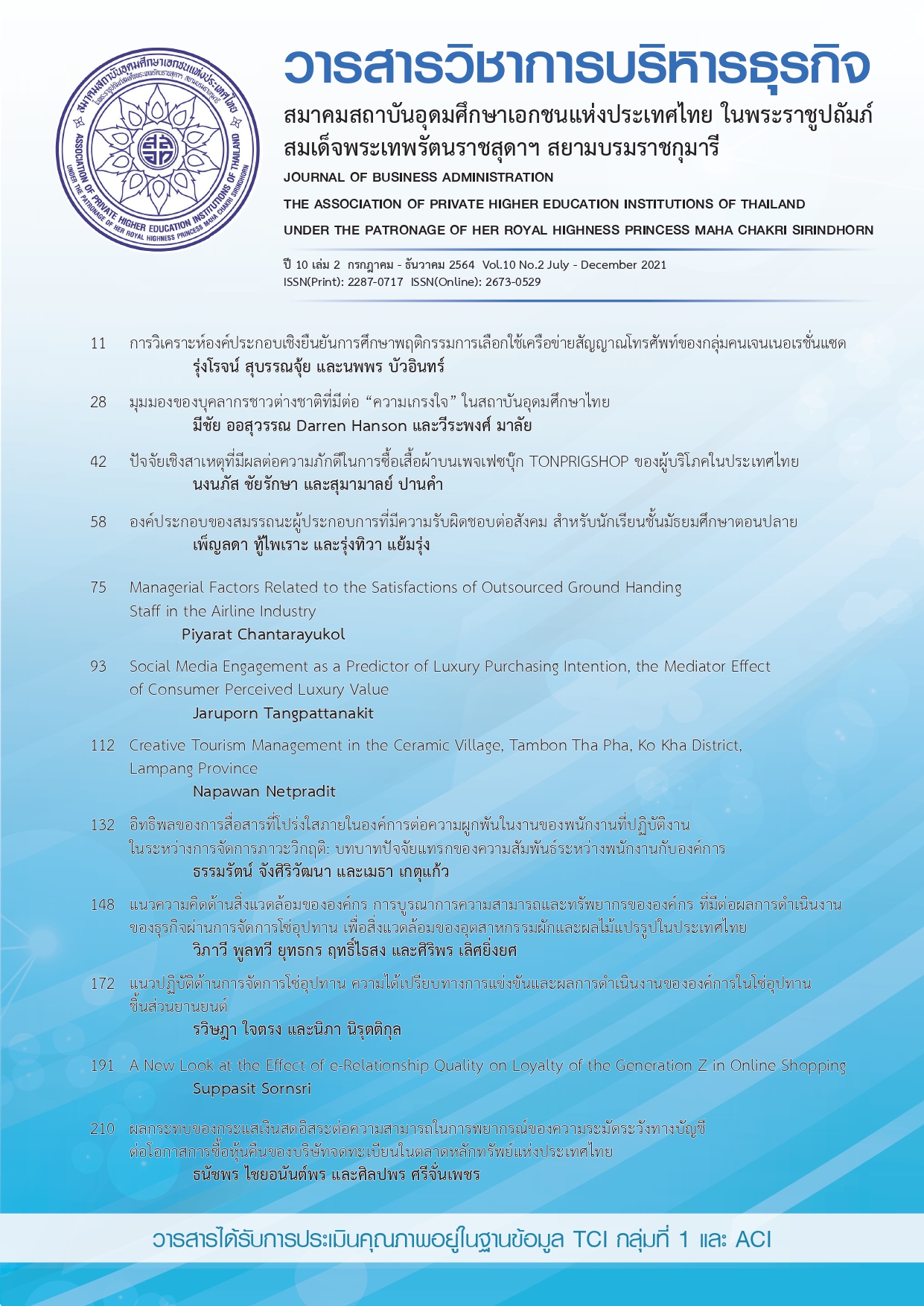The Perception of Foreign Staff towards“Khwam Krengjai” in Thai Higher Education Institutions
Keywords:
Foreigner Perception, Krengjai, Higher Education InstitutionsAbstract
This qualitative study was part of global collaborative work with the Centre for Leadership and
Effectiveness in Organizations (CLEO) at the NEOMA Business School, France. The objective of this research
was to uncover the perception of foreign staff towards the concept of “khwam krengjai” through both
focus groups and in-depth interviews (semi-structured interview). The 7 key informants had taught at higher
education institutions in Thailand. Two interviewees were American, while the other 5 informants were
originally from England, China, Taiwan and Malaysia. All participants agreed that the concept of “khwam
krengjai” was very complex. However, “khwam krengjai” can be observed through three behaviors that
reflected showing respect, avoiding conflict and working styles. Higher Education Institutions should be
open and flexible to accept diverse perspectives, behaviors and working styles of their staff, so it benefits
the organization in both the short and the long run.
References
Black, J.S., Mendenhall, M., & Oddou, G.R. (1991). Towards a comprehensive model of international adjustment:
An integration of multiple theoretical perspectives. Academy of Management Review, 16(2), 291-317.
Chantavanich, S. (2016). Qualitative research data analysis (12th ed.). Bangkok: Chulalongkorn University Press.
Chuatong, N., & Rojchanaprapayont, R. (2016). Values, Ideologies, and communication patterns indicated Thais’ culture. NIDA Journal of Language and Communication, 21(29), 110-114.
Fuangkajonsak, W. (2019). The social functions of “khwam kreng jai” and “enryo” in Thai and Japanese interactions. Journal of Language and Linguistics, 37(1), 48-73.
Huang, S. Y. (2020). Intercultural Adaptation of Chinese Lecturers in Thailand. Humanities, Arts and Social Sciences Studies (FORMER NAME SILPAKORN UNIVERSITY JOURNAL OF SOCIAL SCIENCES, HUMANITIES, AND ARTS), 20(2), 373-398.
Krueger, R. A. (2002). Designing and conducting focus group interviews. Retrieved from https://www.eiu.edu/ihec/Krueger-FocusGroupInterviews.pdf
Malek, M. A., & Budhwar, P. (2013). Cultural intelligence as a predictor of expatriate adjustment and performance in Malaysia. Journal of World Business, 48(2), 222-231.
Matsumoto, D. (2000). Culture and psychology: People around the world (2nd ed.). Wadsworth/Thomson Learning.
Mesinsri, S. (2017). The perception of foreigners towards the way Thai people work. Retrieved from https://www.facebook.com/drsuvitpage/posts/1451810925125633/
Muakyod, P., Chiwan, S., Saihomhual, S., Ying, L., & Boonlue, T. (2020). Cross-cultural adjustment of expatriates working with Thais in Chiang Mai: A Qualitative study in behavioral sciences, Journal of Human Sciences, 21(3), 106-127.
Office of the Higher Education Commission. (2018). Higher educational statistics. Retrieved from http://www.mua.go.th/assets/img/pdf/61.10.26_%E0%B8%AA%E0%B8%96%E0%B8%B4%E0%B8%95%E0%B8%B4%E0%B8%AD%E0%B8%B8%E0%B8%94%E0%B8%A1%E0%B8%A8%E0%B8%B6%E0%B8%81%E0%B8%A9%E0%B8%B2%202558-2560_V4.pdf
Permpon, P. (2014). Conflict management of personnel in Bangkok Thonburi University. Suan Dusit Graduate
School Academic Journal, 10(1), 313-320.
Intachakra, S. (2012). Politeness motivated by the “heart” and “binary rationality” in Thai culture. Journal of Pragmatics, 44(5), 619-635.
Sudjanya, C., & Tongkeo, T. (2019). Internationalization: The importance of Thai higher education institutions on the international stage. Sukhothai Thammathirat Open University Journal, 32(2), 70-87.
Thantayaphinan, S. (2011). Management tactics for a diverse workforce. Executive Journal, 31, 59-64.
Teeraputtigunchai, B. (2018). Communication problems and cross-cultural adjustment of foreigners working in educational institutions, Phetchabun Province. Academic Journal of Humanities and Social Sciences Burapha University, 26(50), 189-212.
Tongyu, A. (2020). EEC target to produce 50,000 jobs to meet the needs of the S-curve industries. Retrieved from https://thaipublica.org/2020/11/eec-model-education/

Downloads
Published
How to Cite
Issue
Section
License
บทความที่ลงตีพิมพ์ในวารสารวิชาการบริหารธุรกิจ สมาคมสถาบันอุดมศึกษาเอกชนแห่งประเทศไทยต้องเป็นบทความที่ไม่เคยได้รับการตีพิมพ์เผยแพร่ หรืออยู่ระหว่างการพิจารณาตีพิมพ์ในวารสารอื่นๆ การละเมิดลิขสิทธิ์เป็นความรับผิดชอบของผู้ส่งบทความโดยตรง

